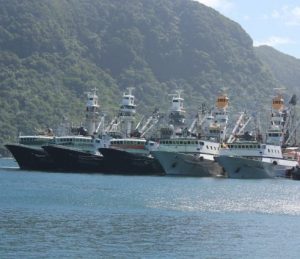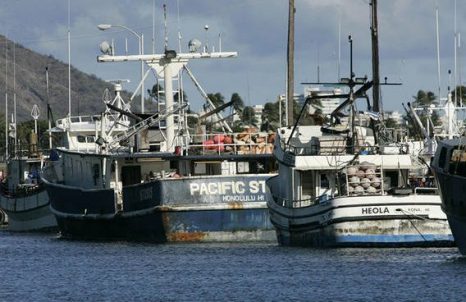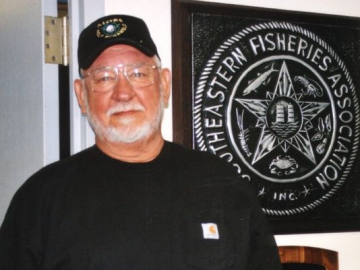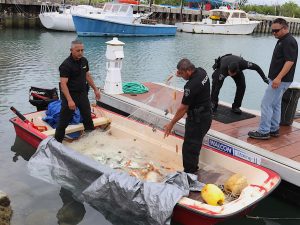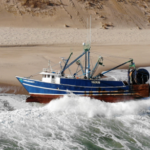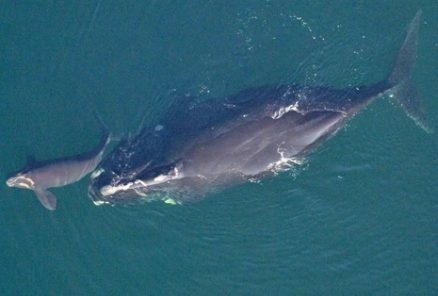Category Archives: Western Pacific
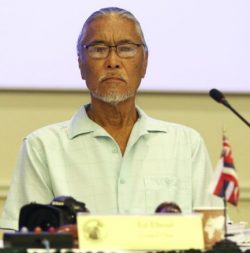
Chairman’s Death Comes At Crucial Time For Western Pacific Fishery Management Council
The unexpected death this summer of Edwin Ebisui has left the Western Pacific Regional Fishery Management Council with an empty seat and a decision to make on who should take over as its permanent chairman. The leadership void comes at a crucial time for the council, which has been pushing the Trump administration to open up protected waters to commercial fishing. “You can be sure there is all kinds of lobbying going on right now,” said Rick Gaffney, a former council member and head of the Hawaii Fishing and Boating Association.,,, Ebisui, 67, was a Honolulu lawyer who fished commercially for bottomfish such as onaga and opakapaka. He was also a strong advocate for Hawaii’s $100 million tuna industry during his tenure on the council. >click to read<09:55
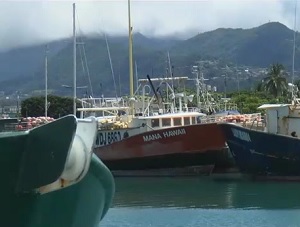
Condition “Zulu” – Fishermen feel vacating the ports ahead of a tropical storm could be dangerous
For the City and County of Honolulu, the Coast Guard anticipated implementing condition “Zulu” by 6 a.m. Tuesday. If that happens, both Honolulu and Kalaeloa harbors will be shut down and all vessels must be evacuated, unless they have permission to stay in port. As of Monday night, Coast Guard officials said they were closely watching Olivia’s track before making any changes to port conditions. With Olivia approaching, some fishing boat owners say they would feel safer staying in the harbor than out at sea. “We are concerned for our fisherman, for their safety, and for their livelihoods. These boats are their lives. To put them into any more immediate danger is more troubling to me,” said Michael Goto, auction manager with the United Fishing Agency. >click to read<15:10
Coast Guard sets port condition ZULU for Hawaii, Maui, Honolulu Counties ahead of Hurricane Olivia – >click to read<
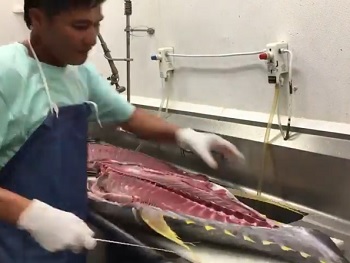
Practice, confidence key to breaking down a fish
I stepped tentatively into the fish-cutting arena guided by the patient, capable Ashley Watts, owner and operator of Local I‘a, which purchases fish from Oahu small-boat fishermen and sells them direct to restaurants and retail customers. Watts reaches the public via farmers markets and through a subscription program called a CSF, or community-supported fishery. Before taking me to the cutting board, Watts arranged for us to watch a master fish cutter at work. Talk about mastery of a craft. Self-taught Rodel Agonoy, who has been breaking down fish for 13 years, tackled a 110-pound yellowfin ahi caught by Kekoa Seward of Hawaii Kai, separating the meat from the spine and quartering it into giant fillets in about 3-1/2 minutes. Video, >click to read<21:10
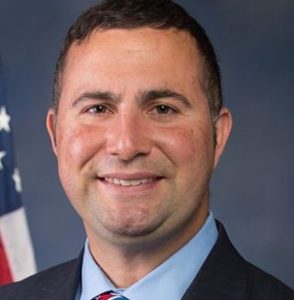
U.S. Rep Darren Soto’s Billfish Conservation Act cuts consumer access to sustainable fresh seafood
The Western Pacific Regional Fishery Management Council is disappointed that America’s seafood consumers may soon be deprived of sustainably harvested domestic marlin products should President Trump sign legislation to prohibit interstate commerce of billfish (not including swordfish) landed in Hawaii, American Samoa, Guam and the Commonwealth of the Northern Mariana Islands. The bill, introduced by U.S. Rep. Darren Soto ’s (D-Fla.), passed the House on June 26 and the Senate on July 30 and is now headed to the president. “It is upsetting, in this era of tackling illegal, unreported and unregulated (IUU) fishing and the $12 billion US seafood trade deficit, that highly monitored US Pacific Island fishing and seafood communities may suffer hardship should this legislation become law,” notes Kitty M. Simonds, executive director of the Western Pacific Regional Fishery Management Council. >click to read<10:34

Sam Parisi: HR-200 was passed in the House and will now move on to the Senate. Push Your Senators!
There has been a lot of those for and against the bill, and after reading the forty-nine pages of the bill and trying to consume it, I have come to the conclusion that over all it is a move in the right direction. The enactment of the 200 mile limit was needed because of foreign fisherman from other countries were destroying our Fisheries and our government at that time had no jurisdiction, Japanese and Russian Factory Ships were invading our waters using small mesh netting scooping up small fish like haddock, cod, flounder, and other bottom dwelling species. I say this because while fishing for whiting off the Canyons near Cape Cod I saw in front of me and fishing along side of me, those factory ships. >click to read<17:48
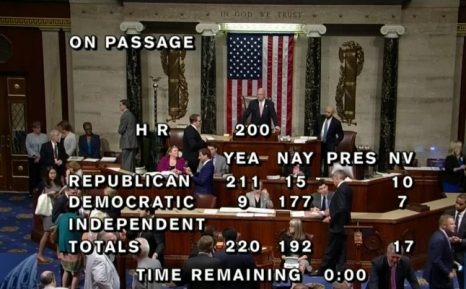
Opinion: Fisheries act is a chance to build trust
There’s a little something for everyone to hate in the House’s proposed renewal of the Magnuson-Stevens Act. Commercial fishermen feel it gives too much to recreational fishermen and environmentalists. Recreational fishermen say it goes too easy on their commercial counterparts, and the environmental lobby says the measure, which passed the House last week along largely partisan lines, will undo years of progress in restoring fish stocks. We are left with what we have had for decades — a pitched battle among competing interests, with no end in sight. Congress must do better to help guarantee that the science behind management decisions is sound and easily understandable. >click to read<19:25

The MSA and Don Young’s partisan dilemma
“We must remain committed to the bipartisan, bicameral tradition of fisheries management,” Rep. Don Young wrote last Sunday, “and my legislation accomplishes just that.” He was referring to the reauthorization of Magnuson-Stevens Act. But when the House passed it on Wednesday, only nine Democrats voted in favor of it. Which explains why, in the same opinion piece, Young complained about “the hyper-partisan mentality” his “Democratic colleagues subscribe to.” Like the breakup of a marriage, there are two sides to this story. The reason why Young is arguing from both might be that he was caught in the middle. >click to read<09:00
House of Representatives – Debate and Passage of HR-200
July 11, 2018 House Session The House meets with debate scheduled on a fisheries management bill sponsored by Rep. Don Young of Alaska. >click to watch<20:52
House votes to overhaul fishery management law – “I’m proud to say that my bill protects our commercial and recreational fisheries’ interests and allow councils to do their jobs in a more streamlined and effective manner,” Rep. Don Young (R-Alaska), the bill’s sponsor, said on the House floor. >click to read<21:41
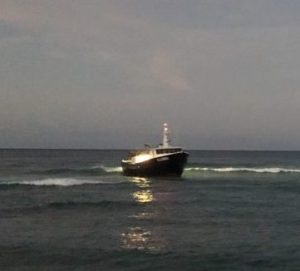
Coast Guard investigating cause of fishing vessel grounding off Honolulu Airport
The Coast Guard is investigating the cause of a fishing vessel grounding off the Honolulu Airport, Wednesday. Coast Guard crews and salvors from Cates Marine responded to the grounding Wednesday morning, the vessel was successfully refloated, and the Coast Guard is investigating the cause of the grounding. About 30 minutes past midnight Sector Honolulu watchstanders received a report from the master of the Sea Goddess, an 83-foot Honolulu-based longliner, they were aground about 150-yards from the middle runway at Honolulu Airport with six people aboard. >click to read<18:43

U.S. Commerce Department Announces Appointments to Regional Fishery Management Councils for 2018
The U.S. Commerce Department announced the appointment of 30 members to the eight regional fishery management councils that partner with NOAA Fisheries to manage ocean fish stocks. Twenty-nine of the new and reappointed council members will serve three-year terms from August 11, 2018 through August 10, 2021. One appointed member is filling an at-large seat recently vacated on the Western Pacific Fishery Management Council and this member will serve through August 10, 2020. >click to read<17:02

U.S. House set to vote on key fisheries bill, HR-200, Tuesday
It’s called the Strengthening Fishing Communities and Increasing Flexibility in Fisheries Management Act, or H.R. 200. It’s also referred to as the Modern Fish Act. Its author, Rep. Don Young, says the bill would update and improve the Magnuson Stevens Act, the primary law that guides federal fisheries regulators. “Reauthorizing the MSA will ensure a proper balance between the biological needs of fish stocks and the economic needs of fishermen and coastal communities,” Young said after the House Natural Resources Committee approved his bill in December. “MSA has not been reauthorized since 2006. It is long past time for this Congress to act and support our nation’s fisheries.” >click to read< Read the HR-200 Bill->click here< 08:39

Lets get every Rep. in the House to Co-Sponsor “American Fisheries Advisory Committee Act” S1322
Greetings from Gloucester! My name is Sam Parisi, and as some of you know, I have been concerned with the process of how S-K Funds, and distribution of the funds have been handled by NOAA.
I have asked our Senators to support Bill S1322 and I am happy to say thanks to Angela Sanfilppo, The Mayor of Gloucester, The Mass Lobster Association, the Gloucester Fisheries Commission and fisherman up and down the coast that have contacted Senator Markey who is on the committee, and is now with us in support of this important the bill, which will be going to the House.,, I ask all of you to contact your Congressmen and Senators in your area’s to tell them to vote in favor Senator Dan Sullivan’s bill, the “American Fisheries Advisory Committee Act”, S1322. >click to read<18:01
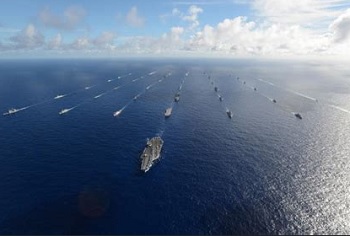
RIMPAC battle lines forming – “They bomb right where we fish,”
It’s the 26th exercise since RIMPAC began in 1971 and the third iteration of the Oceans4Peace Coalition, which works to turn the heads of the public and Legislature against the exercise. “We are committed to educating the public about the Navy’s war games and their impacts on the ocean and our islands,” organizer Gordon LaBedz told TGI before the meeting.,, Shyla Moon, Kauai adviser for the Western Pacific Fishery Management Council, said fishermen are concerned about the impacts to stocks during and after RIMPAC. “They bomb right where we fish,” she said. >click to read<09:51
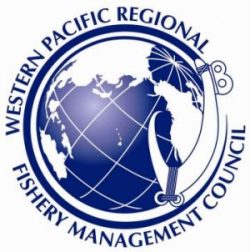
Western Pacific Fishery Management Council Meeting in Wailea, Maui, June 11-13, 2018
Location: Wailea Beach Resort, 3700 Wailea Alanui Dr., Wailea, Maui. >click to read< 16:52
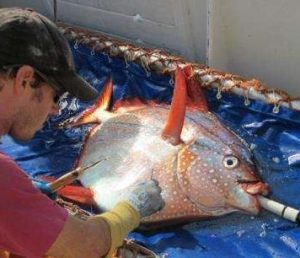
Three New Species Of Warm-Blooded Fish Discovered
Scientists have found three more species of a fish that – despite what we are taught at school – are fully warm-blooded. The species in question are large deep-sea fish known as opah, and are found in many oceans around the planet. A few years ago, the opah made headlines when it was revealed to be the first fully warm-blooded fish species ever discovered. Living in the frigid waters of the deep ocean, it warms its blood by continuously flapping its fins to generate heat. This keeps the fish’s core temperature at about 4 to 5°C (7.2-9°F) >click to read<16:22
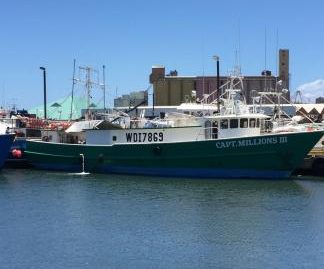
Justice Department fines 2 Hawaii commercial fishing companies over illegal discharge
Two Honolulu-based commercial fishing companies have been ordered to pay civil fines after they discharged oily bilge waste into the Pacific Ocean. Under a settlement reached with the U.S. Department of Justice and the Coast Guard, Triple Dragon, LLC, its company manager and vessel operator have been ordered to pay fines totaling $25,500 for violations of the Clean Water Act and the Coast Guard’s spill prevention and pollution control regulations. The other company, Capt. Millions III, its manager and vessel operator were ordered to pay fines totaling $22,000 for the same violations. >click to read<18:18
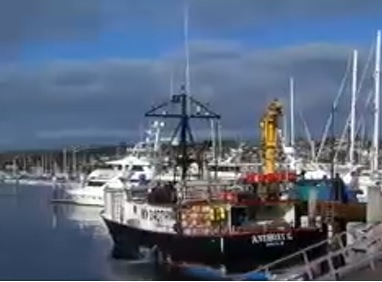
20K-Pound Fresh Fish Catch Helps San Diego Maritime Industry
Thousands of pounds of fish were offloaded Thursday in Point Loma, an occurrence that happens a few times a month in San Diego but is part of an evolving maritime industry. The Port of San Diego is highlighting the commercial fishing industry for “Maritime Month.” Many of the fishermen who work in San Diego have been a part of the local fishing industry for generations and spend weeks at a time at sea. On Thursday, four of those fishermen aboard the boat “Anthony G” used forklifts to unload about 20-thousand pounds of swordfish, tuna, manchong and other fresh catches at Driscoll’s Wharf in Point Loma. Video, >click to read<16:47
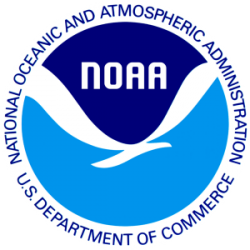
2017 Report to Congress on the Status of U.S. Fisheries
NOAA Fisheries NMFS is pleased to present the 2017 Report to Congress on the Status of U.S. Fisheries managed under the science-based framework established by the Magnuson-Stevens Fishery Conservation and Management Act (MSA). The 2017 report highlights the work toward the goal of maximizing fishing opportunities while ensuring the sustainability of fisheries and fishing communities. Due to the combined efforts of NOAA Fisheries, the eight regional fishery management councils, and other partners, three previously overfished stocks were rebuilt and the number of stocks listed as overfished is at a new all-time low. >click to read<16:04

Tuna Industry Faces a Price-Fixing Scandal as Bumble Bee CEO Faces Criminal Charges
Price-fixing allegations have rocked the food world for the second time this year, as the CEO of Bumble Bee Foods is facing criminal charges for allegedly working to eliminate competition in the packaged seafood industry. Christopher Lischewski has been charged with one count of price fixing. That follows earlier similar charges against three StarKist tuna executives. One, who served as senior vice president for sales, pleaded guilty last year. Two other Bumble Bee executives have already pleaded guilty to price-fixing, and the company itself agreed to pay a $25 million fine for the same offense last year. >click to read<14:27
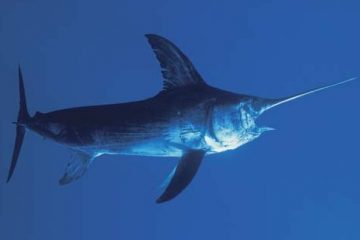
Hawaii’s commercial swordfish fleet shut down for rest of year
Hawaii’s commercial swordfish fleet has been shut down for the rest of the year following a court order aimed at protecting endangered loggerhead sea turtles. The National Marine Fisheries Service closed the Hawaii shallow-set longline fishery in a move heralded Wednesday by conservation groups that sued for the turtle protections. Under the court order the swordfish fishery will close, and a new biological assessment will determine what the limit will be next year. “It’s a good result for all parties,” said Jim Cook, board member with the Hawaii Longline Association. >click to read<10:51

AFT Holdings to Withdraw from Direct Investment in Tuna Vessels
AFT Holdings, Inc. today announced its intent this year to withdraw its direct investment in the U.S. Flagged Ocean Global and Sea Global Fleet of Tuna Seiners. Going forward, the international investment group will focus its resources on its current portfolio of companies, as well as in creating new opportunities in the functional and healthy food space. In 2007, AFT and its principals were one of the original investors to commit to the resurgence of the U.S. Tuna Fleet in the Western Central Pacific. In 2006, the U.S. Fleet had been reduced to 13 vessels,,, >click here to read<19:27
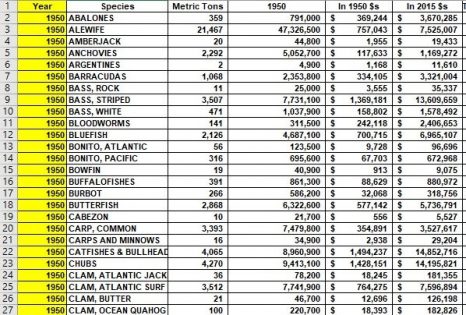
Commercial Fishing in the U.S. Exclusive Economic Zone – What was being caught and where back to 1950
What is the status of commercial fishing in the U.S. Exclusive Economic Zone, the waters from 3 to 200 miles off our coastline? Generally speaking – something that the “bureaucrats in charge” have developed a great deal of facility in doing – it’s pretty good. Since the National Marine Fisheries Service started getting serious about tracking commercial landings (or at making those landings readily accessible) in 1950, the total weight of our domestic landings has increased from 4.9 billion to 9.8 billion pounds. The value of those landings, when corrected for inflation, has increased from $3.3 billion to $5.2 billion, almost as good. Nils E. Stolpe/FishNet USA >click to read<17:03

Billfish Conservation Act: Hawaii seafood wholesalers fear Congress could block mainland marlin exports
Last year, Garden & Valley Isle Seafood, Inc. exported roughly 300,000 pounds of freshly-caught marlin to the mainland. The sales added up to nearly $1.5 million worth of striped marlin, blue marlin and spearfish to wholesalers, supermarkets, chefs and restaurants. Hawaii seafood exporters fear those sales may soon suffer serious slowdowns – more specifically, that Congress is about to pull the plug on that lucrative mainland marlin market. Bills in both the U.S. Senate and U.S. House call for amending the Billfish Conservation Act to prevent the commercial export of marlin caught in Hawaiian waters to the mainland. >click to read<10:08






